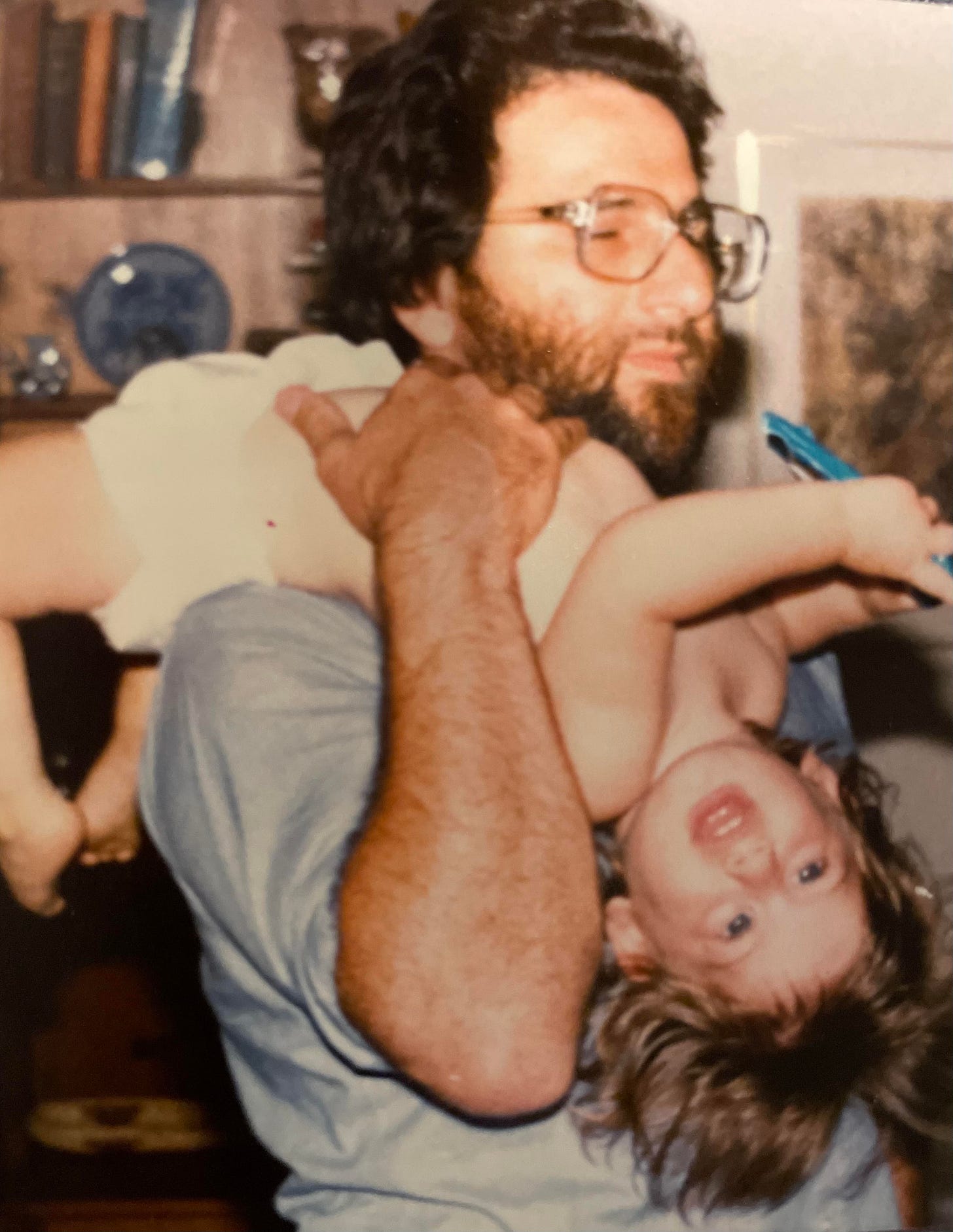The Joy Menu #53: Cry
For years, this dream: the apartment is fatherless and the door is being battered down; without him, we’re vulnerable, and I know this.
Dear Creators,
From bed, I call for my father.
“Ala, Ala,” I say. A version of Alan that fits in my pre-lingual mouth.
Before I form words — this sound. A primal reach into the void, a calling forth, an acquisitive claim on the warmth, peace, protection, comfort which he embodies. Which he brings. Which he is.
“Ala, Ala,” I cry.
(I think now of the near-rhymes: “Allah,” for the Arabic God; “alla,” for the Swedish “all;” “allá” for the Spanish “there.”)
He appears, bearded and bare chested, and lifts me to his skin. Presses me into his heat, into the body which is his but still, I think, nearly mine.
In seconds, I am asleep.
For years, this dream: the apartment is fatherless and the door is being battered down; without him, we’re vulnerable, and I know this. It’s me, my mother, and my baby brother — my only thought is fear. The wood splinters. We lunge from the door.
This is the feeling of no father.
That day, we have soccer practice on an unusual field.
Sometimes (rarely) this happens. There are so many well-equipped fields in town: bright overhead lights, ample bathrooms with easy access, large parking lots. But today we’re at the Alternative High School, on a field tucked behind the portables, locked in on one side by a shopping center, and by the dry creek on the other.
(Years later, I’ll walk this creek on my way to and from school; I’ll gaze at its concrete bed when feeling lost during marching band; I’ll escape down its slanted siding to avoid a distressing Physics Lab when I’m getting my first D; I’ll watch it overfill with angry grey water when El Niño rushes through town.
But this is all later; I don’t know any of this yet).
For some reason, my father has come to get me late — or perhaps he’s early — and we’re walking out alone, along the single poorly-lit black tar pathway that leads from the hidden soccer field to the too-small parking lot out front.
A few yards ahead, a chain has been raised and strung between two posts, to keep cars from entering the field (thought it’d be a shortcut to nowhere). I begin to move toward it, picking up speed, and know I want to jump, and that my father disapproves.
Maybe he says something, though I don’t remember words — only a sudden surge of energy and an urge to throw myself up, to reach my body into the air and grasp a sliver of rebellion — and a heavy knowing that I shouldn’t.
But I do make the leap, and my toes catch the chain. Like a wet towel snapped, or a branch cracked in a storm, I flip onto the tar faster than I went up.
I slide, painting my forearms, my knees, my chin black and red.
Before I open my eyes in alarm or fill my lungs with a wail, my father lifts me into his arms, carries me to and then from the car, and deposits me in a warm bath.
I am ashamed.
For years, and even now, an old guilt, an embarrassment, like a bad knee’s ache in cold weather.
Why did I do it? Logically: I was a child carried by a moment, lifted from my usual careful self.
Was he mad? If so, I don’t remember.
What I remember are his explanations: “Your legs were tired.” “You’d been running for hours.” “Your cleats made your feet a half-inch longer.”
I remember the soap stinging my scrapes; him telling me to close my eyes; the warm water poured over my head. I remember his hands rough on my scalp. The softness with which he put bandages on the cuts; the squeeze, eternal, of his soft hands.
I remember he wrapped me in a towel like a sack of potatoes and put me in the cupboard to dry.
To be a gentle boy. Soft-skinned. Sensitive.
To call out for a father whose thick arms host tendons which bulge, biceps nestled like softballs, shoulders forested and as sturdy as posts.
To long to be in those arms. Held by them. Held up by them.
Is there masculinity in that?
Does it go both ways?
Does it need to?
In the dreams — or let’s call them what they are: nightmares — I am always fatherless, always unprotected, always called upon to protect.
And I fail.
There is shame there: in the fear of fatherlessness and the failure to rise to the occasion.
But I do fail. And then, always, I wake.
Why is there shame in that fall? Why, thirty years later, a bouquet of feelings scented with sorrow and regret?
Embarrassment to have fallen, and then called to him? To have gone against him, and then needed him? To have rejected him, and then cried out for him? To have leapt from him, and then longed for him —
To be held by him, helped by, healed by him?
I don’t have those dreams anymore. Just as I don’t dream of driving, now that I drive.
I always woke, anyway, before the end.
Always woke to a world with my father in it.
Onward to creative joy,
Joey


